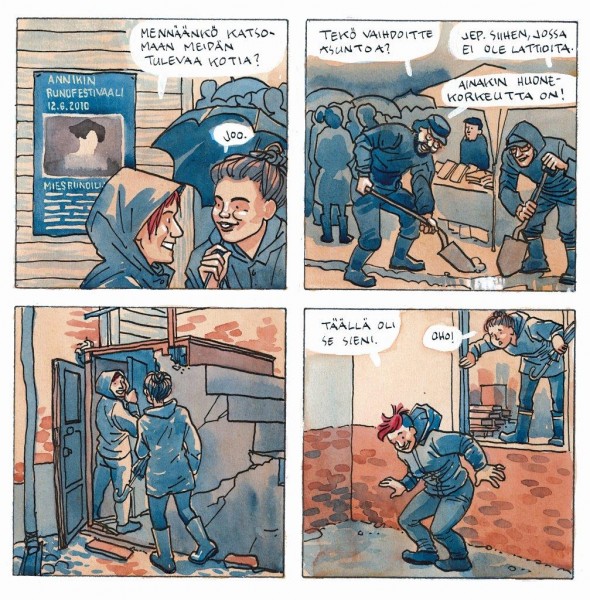Search results for "sofi oksanen/feed/www.booksfromfinland.fi/2012/04/2010/10/mikko-rimminen-nenapaiva-nose-day"
Mikko Rimminen: Nenäpäivä [Nose day]
29 October 2010 | Mini reviews, Reviews
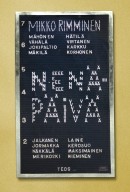 Nenäpäivä
Nenäpäivä
[Nose day]
Helsinki: Teos, 2010. 339 p.
ISBN 978-951-327-1
€ 25.90, hardback
Female protagonists as sympathetic as this are rare in contemporary literature; in this third novel by Mikko Rimminen (born 1975), Irma is a solitary, slightly awkward outsider who gets badly tangled up in a muddle of her own making. She poses as a door-to-door market researcher – in order to meet people. Rimminen employs a more complex plot than in his previous novels (his 2004 debut work, Pussikaljaromaani, ‘A six-pack novel’, about idle young men, has been translated into five languages). The author is an acknowledged master of the slow narration: he is skilled at describing the sound of silence and giving a page-long description of the behaviour of a mobile phone in someone’s hand. All that passes unsaid and unseen between people is cleverly and hilariously put into words. Rimminen’s Finnish is highly original – he keeps creating new verbs and compounds – and his characters who stand on the margins hankering after ordinary life gain the reader’s genuine sympathy.
Finland(ia) of the present day
2 December 2010 | In the news

Mikko Rimminen. Photo: Heini Lehväslaiho
The Finlandia Prize for Fiction 2010, worth €30,000, was awarded on 2 December to Mikko Rimminen (born 1975) ; his novel Nenäpäivä (‘Nose day’, Teos) was selected by the cultural journalist and editor Minna Joenniemi from a shortlist of six.
Appointed by the Finnish Book Foundation, the prize jury (Marianne Bargum, former publishing director of Söderströms, researcher and writer Lari Kotilainen and communications consultant Kirsi Piha) shortlisted the following novels:
Joel Haahtela: Katoamispiste (‘Vanishing point’, Otava), Markus Nummi: Karkkipäivä (‘Candy day’, Otava), Riikka Pulkkinen: Totta (‘True’, Teos), Mikko Rimminen: Nenäpäivä (‘Nose day’, Teos), Alexandra Salmela: 27 eli kuolema tekee taiteilijan (’27 or death makes an artist’, Teos) and Erik Wahlström: Flugtämjaren (in Finnish translation, Kärpäsenkesyttäjä, ‘The fly tamer’, Schildts). Here’s the FILI – Finnish Literature Exchange link to the jury’s comments.
Joenniemi noted the shortlisted books all involve problems experienced by people of different ages. How to be a consenting adult? How do adults listen to children? Contemporary society has been pushing the age limits of ‘youth’ upwards so that, for example, what used to be known as middle age now feels quite young. And, for example, in Erik Wahlström’s Flugtämjaren (now also on the shortlist for the Nordic Literature Prize 2011) the aged, paralysed 19th-century author J.L. Runeberg appears full of hatred: being revered as Finland’s national poet didn’t make him particularly noble-minded.
According to Joenniemi, Rimminen’s novel ‘takes a stand gently’ in its portrayal of contemporary life – in a city where a lonely person’s longing for human contacts takes on tragicomical proportions. Joenniemi finds Rimminen’s language ‘uniquely overflowing’. Its humour poses itself against the prevailing negative attitude, turning black into something lighter.
Rimminen has earlier published two collections of poems and two novels (Pussikaljaromaani, ‘Sixpack novel’, 2004, and Pölkky, ‘The log’, 2007) . Pussikaljaromaani has been translated into Dutch, German, Latvian, Russian and Swedish.
RSS feeds
4 February 2009 |
Subscribe to our RSS feeds here.
- All categories: Books from Finland main RSS feed
/ Subscribe by email
By category:
- Fiction (extracts): RSS feed / Subscribe by email
- Drama: RSS feed / Subscribe by email
- Comics: RSS feed / Subscribe by email
- Poetry: RSS feed / Subscribe by email
- Prose: RSS feed / Subscribe by email
- Children’s books: RSS feed / Subscribe by email
- Non-fiction: RSS feed / Subscribe by email
- Reviews: RSS feed / Subscribe by email
- Authors: RSS feed / Subscribe by email
- This ‘n’ that: RSS feed / Subscribe by email
- Editorial: RSS feed / Subscribe by email
By subject (tag):
- Biography: RSS feed / Subscribe by email
- Children’s books: RSS feed / Subscribe by email
- Classics: RSS feed / Subscribe by email
- Contemporary art: RSS feed / Subscribe by email
- Finnish history: RSS feed / Subscribe by email
- Literary prizes: RSS feed / Subscribe by email
- Novels: RSS feed / Subscribe by email
- Photography: RSS feed / Subscribe by email
- Poetry: RSS feed / Subscribe by email
- Short stories: RSS feed / Subscribe by email
Des res
Extracts from the novel Juoksuhaudantie (‘The Trench Road’, WSOY, 2002)
Matti Virtanen
I belonged to that small group of men who were the first in this country to dedicate themselves to the home front and to women’s emancipation. I feel I can say this without boasting and without causing any bickering between the sexes.
A home veteran looks after all the housework and understands women. Throughout our marriage I have done everything that our fathers did not. I did the laundry, cooked the food, cleaned the flat, I gave her time to herself and protected the family from society. For hours on end I listened to her work problems, her emotional ups and downs and her hopes for more varied displays of affection. I implemented comprehensive strategies to free her from the cooker. I was always ready with provisions when she got home exhausted after a day at work. More…
Sofi Oksanen wins the 2008 Finlandia Prize
10 February 2009 | In the news

Sofi Oksanen. - Photo: Toni Härkönen/WSOY.
The Finlandia Prize for Fiction, Finland’s most prestigious literary prize, was awarded to Sofi Oksanen’s novel Puhdistus (‘Purge’, WSOY, 2008). ‘When the concentrated focus of drama and the multidimensionality of narrative conjoin, Puhdistus is born – a muscular, harsh, and solid book’, said the writer and critic Pekka Tarkka awarding the prize on 4 December. (For a short review, see the Review section.)
The prize, worth € 30,000, was awarded for the twenty-fifth time. The final choice was made from the shortlist of six candidates; the others were 14 solmua Greenwichiin (‘14 knots to Greenwich’, Otava) by Olli Jalonen, Kosmonautti (‘The cosmonaut’, Tammi) by Katri Lipson, Marie (Otava) by Arne Nevanlinna, Kohtuuttomuus (‘Excess’, Siltala) by Pirkko Saisio and Paholaisen haarukka (‘The Devil’s fork’, WSOY) by Juha Seppälä. More…
Solzhenitsyn and Silberfeldt: Sofi Oksanen publishes a best-seller
25 April 2012 | In the news
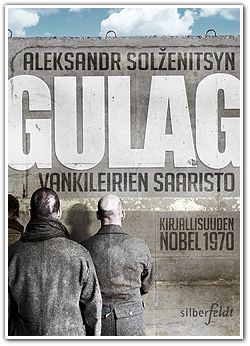
Nobel Prize 1970: Aleksandr Solzhenitsyn
After falling out with her original publisher, WSOY, in 2010, author Sofi Oksanen – whose third novel, Puhdistus (Purge, 2008), has become an international best-seller – has founded a new publishing company, Silberfeldt, in 2011, with the aim of publishing paperback editions of her own books. Its first release was a paperback version of Oksanen’s second novel, Baby Jane.
Oksanen’s new novel, Kun kyyhkyset katosivat (‘When the pigeons disappeared’), again set in Estonia, will appear this autumn, published by Like (a company owned by Finnish publishing giant Otava).
However, in April Silberfeldt published a new, one-volume edition of the autobiographical novel The Gulag Archipelago by the Nobel Prize-winning author Alexandr Solzhenitsyn. This massive book was first published in the West in 1973, in the Soviet Union in 1989.
A Finnish translation was published between 1974 and 1978. Back in those days of Cold War self-censorship, Finnish publishers felt unable to take up the controversial book, and the first volume was eventually printed in Sweden. The work, finally published in three volumes, has long since been unavailable.
This time the 3,000 new copies of Solzhenitsyn’s tome sold out in a few days; a second printing is coming up soon. Oksanen regards the work as a classic that should be available to Finnish readers.
Nordic prize to Sofi Oksanen
31 March 2010 | In the news
The Nordic Council’s Literary Prize 2010 has been awarded to Sofi Oksanen for her novel Puhdistus (‘Purge’, WSOY, 2008).
The winning novel was selected by a jury from a shortlist of 11 works from the Nordic countries. The prize, worth approximately 47,000 euros, will be awarded in Reykjavik in November.
The novel, about women’s fates in the violent history of 20th-century Estonia, was awarded both the Finlandia Prize for Fiction and the Runeberg Prize in Finland, where it has sold more than 142,000 copies.
So far publication rights have been sold to 27 countries; the English translation, by Lola Rogers, will appear next month in the US, published by Grove Press.
Sofi Oksanen: Puhdistus [Purge]
5 February 2009 | Mini reviews
![Sofi Oksanen: Puhdistus Sofi Oksanen: Puhdistus [Purge]](https://booksfromfinland.fi/wp-content/uploads/2009/02/puhdistusweb-130x164.jpg) Puhdistus
Puhdistus
[Purge]
Helsinki: WSOY, 2008. 380 p.
ISBN 978-951-0-33973-2
€ 29.90, paperback
Sofi Oksanen’s first play Puhdistus (‘Purge’) was staged at Finland’s National Theatre in 2007. Oksanen (born 1977) has an Estonian-Finnish background and studied at the Theatre Academy. Puhdistus, her third novel, retells the story of her play about two women and moves through the past by flashbacks between 1939 and 1992. Aliide has experienced the horrors of the Stalin era and the deportation of Estonians to Siberia, but she herself has to cope with the guilt of opportunism and even manslaughter. More…
Sofi Oksanen: Kun kyyhkyset katosivat [When the doves disappeared]
9 October 2012 | Mini reviews, Reviews
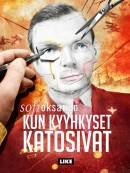 Kun kyyhkyset katosivat
Kun kyyhkyset katosivat
[When the doves disappeared]
Helsinki: Like, 2012. 365 p.
ISBN 978-952-01078-19
€ 27.90, hardback
Four years after the huge national and international success of her third novel Puhdistus (Purge, 2008, now translated into 38 languages), Sofi Oksanen has published a new novel to the accompaniment of trumpets and drums – a launch cruise to Tallinn, Estonia, workshops and public readings. The Finnish film version of Puhdistus received its world premiere at the same time. Oksanen has earned her star status as a writer, but Kun kyyhkyset katosivat is not as good as its predecessor. The story of Estonian freedom fighter (‘Forest Brother’) Roland and his cousin Edgar, an opportunist who manoeuvres his way through the Nazi and Soviet occupations of Estonia from 1941 until the apparent liberalisation of the 1960s, is thin and fragmentary. The language and style are uneven and diffuse, while Edgar’s chameleon-like shifts of identity from pro-German sympathies through Siberia to complicity with the KGB deserve to be more carefully explored. While the book’s themes are unquestionably authentic and relevant, they don’t really blend together into a moving novel in the way that Puhdistus does.
Translated by David McDuff
Prix Femina for Sofi Oksanen
5 November 2010 | In the news
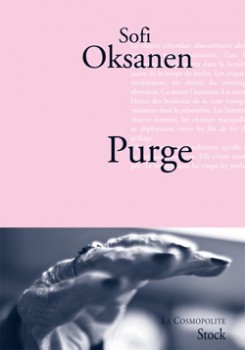 Sofi Oksanen’s novel Puhdistus (English translation, Purge, by Lola Rogers; French translation, also entitled Purge, by Sébastien Cagnoli), was awarded the French literature prize Prix Femina Étranger in early November.
Sofi Oksanen’s novel Puhdistus (English translation, Purge, by Lola Rogers; French translation, also entitled Purge, by Sébastien Cagnoli), was awarded the French literature prize Prix Femina Étranger in early November.
The Prix Femina was founded by the editors of the magazine La Vie heureuse (nowadays Femina) in 1904 as a counterbalance to the Prix Goncourt and the male-dominated award system. The jury members of Prix Femina are women only – whereas the prize can be awarded to either gender.
Among earlier winners of the Prix Femina Étranger – awarded since 1985 for the best foreign novel – are Amos Oz, Joyce Carol Oates and Ian McEwan.
The rights of Oksanen’s novel have so far been sold to 36 countries; Purge has sold approximately half a million copies the world over. In France – where the book also won the Le Prix du Roman Fnac in June – four print runs have sold more than 70,000 copies.
French prize for Sofi Oksanen
26 August 2010 | In the news
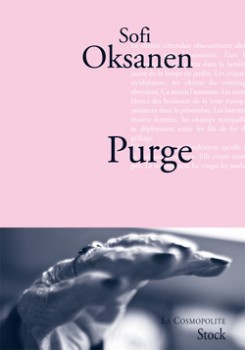 In August the ninth Prix du Roman FNAC was awarded to Sofi Oksanen (born 1977) for her novel Puhdistus (English translation, by Lola Rogers: Purge; see a recent British review [Guardian, August 21] here), to be published in French (by Editions Stock) on August 25 under the title Purge. This is the first time FNAC – the largest bookshop chain in France – has awarded the prize to an author who doesn’t write in French.
In August the ninth Prix du Roman FNAC was awarded to Sofi Oksanen (born 1977) for her novel Puhdistus (English translation, by Lola Rogers: Purge; see a recent British review [Guardian, August 21] here), to be published in French (by Editions Stock) on August 25 under the title Purge. This is the first time FNAC – the largest bookshop chain in France – has awarded the prize to an author who doesn’t write in French.
The jury consists of 900 booksellers and representatives from the general public. They read 300 novels published in France this year, and the winner was chosen out of 30 finalists.
The Finnish production company Solar Films Inc. will transform Puhdistus into a film in 2012: the screenwriter is Marko Leino.
Once more: Sofi Oksanen’s novel wins a prize
10 December 2010 | In the news
Sofi Oksanen (born 1977) has received the Europe Book Prize, worth €10,000, for her novel Puhdistus (Purge, 2008). Chosen from a shortlist of eight works, the prize was awarded by the ex-chairman of the European Union Commission, Jacques Delors, in Brussels on 9 December.
The European Book Prize jury is made up of European journalists and correspondents and was chaired by the German film director Volker Schlöndorff. According to the jury, Puhdistus is ‘a brave and painful exploration into the traumas of the Estonian history’.
The prize was awarded this year for the fourth time. The author expressed her appreciation of the prize by saying Europeanness for her signifies freedom of speech, respect for human rights and the will of sustaining these fragile and easily damaged values.
Chronicles of crisis
31 December 1982 | Archives online, Fiction, Prose
Books from Finland presents here an extract from Dyre prins, a novel by the Finland-Swedish writer Christer Kihlman that is to be published in 1983 by Peter Owen of London under the title Sweet Prince, in a translation by Joan Tate.
Christer Kihlman (born 1930) first became known as a poet; but, after publishing two collections of poetry, he turned to novels. He has been branded a merciless scourge of the bourgeoisie. Equally important in his writing, however, are his masterly psychological analyses, his examination of the myriad aspects of the human personality, his sovereign disregard for taboos and his unflagging search for the truth. His books are about crises – the conflict between the generations, between the individual and society, between opposing political ideologies, between homosexual and heterosexual love. As Ingmar Svedberg remarked in an extensive appreciation of Kihlman’s work that appeared in Books from Finland 1-2/1976, ‘In his perceptive moral analyses, his exploration of the depths of human destructiveness and degradation, Kihlman is sometimes reminiscent of Faulkner.’ Since 1970, Kihlman has published three revealing autobiographical works, two of them dealing with his encounter with South America; Dyre prins, first published in 1975, represents a brief interlude of fiction.
The extract printed below is accompanied with a personal appreciation of the novel by its English translator, Joan Tate
Grandfather’s astonishing revelation gave me a new perspective on my life. I had suddenly been given a concrete, genuine foundation for both my hatred and my self-esteem. In a way I took the story of my origins as an extreme confirmation of the rightness of the Communist interpretation of reality, and at the same time it gave me a wonderful, dazzling sensation of being someone, despite everything, of having a place in a meaningful human perspective of time, despite everything, of being a link, however modest, in the historical family tradition. I did not need to found a dynasty; I already belonged to a dynasty, if only a minor branch. One was less important than the other, and even if the two experiences were irreconcilable and contradictory, they existed all the same in the same consciousness, contained within the same consciousness, my consciousness. I, Donald Blad! More…
Picture this
9 April 2015 | Articles
It’s impossible to put Finnish graphic novels into one bottle and glue a clear label on to the outside, writes Heikki Jokinen. Finnish graphic novels are too varied in both graphics and narrative – what unites them is their individuality. Here is a selection of the Finnish graphic novels published in 2014
Graphic novels are a combination of image and word in which both carry the story. Their importance can vary very freely. Sometimes the narrative may progress through the force of words alone, sometimes through pictures. The image can be used in very different ways, and that is exactly what Finnish artists do.
In many countries graphic novels share some common style or mainstream in which artists aim to place themselves. In recent years an autobiographical approach has been popular all over the worlds in graphic novels as well as many other art forms. This may sometimes have led to a narrowing of content as the perspective concentrates on one person’s experience. Often the visual form has been felt to be less important, and clearly subservient to the text. This, in turn, has sometimes even led to deliberately clumsy graphic expression.
This is not the case in Finland: graphic diversity lies at the heart of Finnish graphic novels. Appreciation of a fluent line and competent drawing is high. The content of the work embraces everything possible between earth and sky.
Finnish graphic novels are indeed surprisingly well-known and respected internationally precisely for the diversity of their content and their visual mastery.


